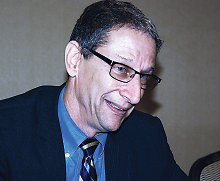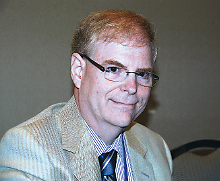Of the 2 million Americans who fought in Afghanistan and Iraq over the last dozen years, a disproportionate number came from—and are returning to—rural areas, according to Washington Post reporter David Finkel.
“Most are OK, and some are better because of their experience, but perhaps half a million have psychological wounds because of what they did or didn’t do, or saw,” Finkel told clinicians at the National Association for Rural Mental Health’s annual meeting in Washington, D.C., in July.
“The wars may be over, but we are now in the after-war phase, and it is coming to rural areas,” said Finkel, author of The Good Soldiers and Thank You for Your Service, two books about the experiences of an Army infantry battalion during and after deployment.
“War did what war does,” he wrote. “Invincibility faded. The sense of mission was gone. They were just there for the next guy.”
Given that veterans are more likely to live in rural areas than the average American, the Veterans Affairs (VA) rural health and mental health programs are working together to provide new outreach and access to services in ways that rural veterans and their families value, said Harold Kudler, M.D., chief consultant for mental health services at the Veterans Health Administration (VHA), who spoke after Finkel’s talk. “Initiatives range from offering telemental health services in veterans’ homes to educating rural clergy members about the issues facing veterans and their families and helping them know when and how to refer a veteran to the VA.”
Veterans’ deep connection to their fellow soldiers have often left them “cloaked in guilt and shame” when members of their unit died in action, said Kudler. In some way, they felt that their friends died so that they could live.
“The guilt runs so deep that it defines the soldier now,” said Kudler. The soldier keeps his friends alive through his own suffering, paradoxically an act of heroism and friendship.
Helping those who have served in war zones demands an intensely personal approach to care, he said. “Watch out for ‘running the algorithm,’ ” he cautioned, “because they will know that you are protecting yourself from what they are telling you.”
That does not, however, mean that clinicians treating these veterans should ignore the value of evidence-based treatments. “There are aspects of human experience that don’t come down to our nerves or our genes,” he stated. “Medications can help a patient sit long enough to talk but can’t fix the core problem, which is trying to make sense out of something.”
Clinicians also must understand military life and language, just as with any cultural group, he said. They should take a military history not only of their patients, but also of their families.
“And don’t simply ask ‘Are you a veteran?’ ” Kudler advised. To someone who served in Iraq or Afghanistan, “veteran” often connotes someone much older—such as someone who served in World War II or the Vietnam War.
“Ask instead if they have served in the military and if that service has affected their health—physical or mental—in any way,” he said. “That is a question you may have to ask many times, in different ways.”
The therapeutic actions of exposure therapy and cognitive processing therapy (now widely used throughout the VHA) are analogues of psychoanalysis because they help overcome the avoidance of traumatic memory, said the analytically trained Kudler.
“The patient is and must be the agent in his own life,” he said. “We must give them back the authority to save themselves, which they don’t believe they have and which they don’t think they deserve. This gives the patient the support needed to stop haunting his own life and start living his own life.” ■
The website of the National Association for Rural Mental Health can be accessed
here.


